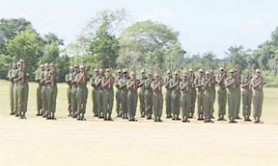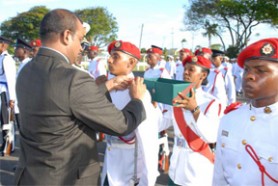Hardly a month seems to pass without some new report of serious indiscipline in the Guyana Defence Force. Is soldiers’ behaviour deteriorating?
Since becoming Chief of Staff of the Guyana Defence Force a little more than two years ago in September 2007, Commodore Gary Best has been lecturing military officers, cadets and recruits ceaselessly about military misbehaviour. The internal disciplinary situation in the Force, however, seems to be deteriorating. The nadir might have been reached with the robbery-murder of a young gold-dealer by members of the Coast Guard at Caiman Hole, East Bank Essequibo, last August.

It was worse than a public relations catastrophe that made headline news. It shook the confidence of the country in one institution that seemed never to have lost its moral compass. But that murder was only one of the most recent in a series of scores of other disciplinary incidents that have plagued the Force over the years. As late as 25th October, another armed Coast Guard officer and three ratings based at Morawhanna in the Barima-Waini Region found themselves at Parika with a cargo of allegedly smuggled fuel where they were arrested.
Coming from within the Force which he joined 29 years ago and particularly from the Coast Guard in which he spent most of his career, Best is no stranger to military conditions. He must be well aware of the complete chronology and catalogue of crimes. The question is, can he and his staff solve the problem of indiscipline?
Command
Weeks after he was appointed Chief of Staff, Best had declared to a soldiers’ training course that “discipline within the military is under question.” He recited a list of commandments to recruits’ course at the Colonel John Clarke Military School at Tacama: “Do not get involved in illegal activities; do not steal from your fellow soldiers; do not steal while on patrols; do not conduct your own operations for private gain. That is not the purpose of [being] a soldier. Your duty is to keep Guyana safe.” Speaking at the Colonel Ulric Pilgrim Officer Cadet School at Timehri a few weeks later, he admonished the cadets to “Uphold your own and the Force’s integrity through the display of proper conduct and superlative leadership.”

Best, in a recent newspaper interview, admitted that there was “a definite command and leadership problem,” in the Force at present. Referring, for example, to the Caiman Hole incident, Best confirmed that the Coast Guard did have explicit regulations forbidding the stopping and searching of vessels in internal waters. These regulations were in place long before but, he said, subordinates “were not properly supervised and reports of improper conduct were not acted on.”
Colonel Bruce Lovell − who was appointed to his post as Colonel General Staff at the same time as Commodore Best’s promotion − had been addressing the same problem. Lovell last month spoke at a special “command briefing” which seems to have been convened to deal with the questions of discipline and leadership. Referring to the Caiman Hole incident, he recommended a sort of ‘zero tolerance’ approach, advising officers that ‘even the smallest infraction’ committed by their subordinates must not be tolerated and encouraging them to deal with misconduct professionally and humanely.
Acknowledging the fact that the misbehaviour of young officers and soldiers reflected inadequacies and deficiencies on their respective initial cadet and recruit training courses, Lovell had declared, as long ago as January 2008, that there needed to be a “paradigm shift” in the Force’s approach to security and a “revolution” in its professional culture. He believed that there was a need to critically examine the roles, doctrine, structure and organisation.
Lovell emphasised that the erosion of discipline must be arrested by commanders demonstrating true leadership qualities. An official press release quoted him as saying “We have many commanders, but few leaders.” He also pointed out that officers are commissioned to hold command appointments and must remember that leadership was central to command.
He declared “To ignore the mediocrity of subordinates is to be derelict in your duties. Some have adopted the untenable position that with a new generation and societal changes your standards must be adjusted to suit. This is the belief of those who seek any excuse for laziness and ineptitude. We must not compromise our standards for, when we do, it is everyone’s loss.”
Causation
Both Best and Lovell seem to think that the causes of the contagion of misconduct have arisen mainly out of deficiencies in command and leadership. But who is to be blamed for the events of the past, the cumulative effects of which are evident today? Whatever the answer, the present cadre of commanders cannot avoid responsibility for responding to the wave of crimes which have now become quite unacceptable but first they must correctly comprehend the causes of the problems.
It is evident that the Force’s involvement in the Troubles on the East Coast of Demerara – from Operation Tourniquet in 2002 through to Operation Restore Order in 2008 – was a contributory factor to military misbehaviour. Launched in June 2002, the military operation was meant to stanch the blood-letting and the violent crime wave which started with the escape of five persons from the Georgetown Prison on 23rd February that year.
The Defence Force was unprepared for a long-term, anti-crime operation in villages without specific mandate to arrest, detain and interrogate suspects. Many of its patrols and other activities were not accompanied by the police in support of whom they were deployed in the first place. As a result, they were too frequently left on their own.
The Force itself had little capacity for criminal intelligence and never performed efficiently as a policing agency. Its deepening involvement in law-enforcement operations made bad worse. In one case, President Bharrat Jagdeo, the Minister of Defence, announced publicly that the USA indictment on narco-trafficking charges of a former major − who testified against the self-confessed narco-trafficker Shaheed ‘Roger’ Khan − vindicated his decision in May 2003 not to promote him when he was still a member of the defence force.
What at first should have been straightforward law-enforcement activity to arrest five escapees from the Georgetown Prison was allowed to degenerate into the gravest security crisis since Independence. The troubles continued to spin out of control becoming a complex operation that eventually involved narcotics, politics, ethnic relations, gun-running, death squads, arson, rape, robbery, murder and, in the worst cases, mass murder and massacre. Many of the Force’s present problems – including the corruption of some officers by the notorious narco-trafficker Shaheed ‘Roger’ Khan – can be traced to its involvement in the Troubles. A few greedy officers did actually become Khan’s paid agents.
As members of the Guyana Police Force became targetted for murder by the bandits, members of the Guyana Defence Force were deployed in increasing numbers. Finally, the Force established a camp in the precincts of Buxton Village – regarded as the epicentre of the crime wave.
Catalogue of crimes
As early as July 2002 at the start of the Troubles, newspapers carried reports of rogue soldiers stealing M-70 assault rifles and selling them to civilians. As matters became worse, People’s National Congress-Reform and Opposition Leader Desmond Hoyte requested to meet the military high command led by Chief of Staff Brigadier Michael Atherley to discuss the military deployment in the stricken East Coast areas.
This suggested that there was already serious public concern about the widely-reported breakdown of discipline which occurred since the military involvement began. In May 2003, the National Assembly passed a resolution establishing the Disciplined Forces Commission for the very purpose of identifying and correcting the problems which were becoming evident not only in the Defence Force but also in the Police, Prisons and Fire Services.
In those early days, incidents of indiscipline included a soldier’s apparent suicide at his parents’ home; the death of another soldier in a vehicle smash-up; the accidental shooting of at least two civilians by soldiers; allegations of the sale of weapons by soldiers to civilians; the disappearance of detainees from ‘secure’ military custody in Camp Ayanganna; the prevention of residents from forming bucket brigades to put out fires in Buxton-Friendship and at least one fracas with male prostitutes.
In succeeding years by which time large numbers of troops were committed to policing the areas affected by crime, disciplinary problems started to erupt among troops who had served in those crime areas and had been stationed in other places. For example, a soldier was badly burnt when another soldier deliberately set fire to a building at a military camp in the hinterland. A soldier was arrested over the death of another soldier whose body was found in the barracks at Timehri. An officer was arraigned on charges of shooting to death one of his private soldiers at a hinterland camp. A court found a soldier guilty of manslaughter for killing of another soldier at a camp on the East Coast.
The event which evinced the grossest institutional negligence, perhaps, was the theft in February 2006 of several AK-47 rifles from an ordnance bond in Camp Ayanganna. More than any other incident, the weapons theft indicated how thoroughly criminals had penetrated the Force and how confident the mastermind was to carry out such a heist, evidently with the collaboration of serving personnel.
More recently, prior to the Caiman Hole incident, officers were alleged to have been involved in the torture of their own soldiers and of two Buxton villagers. Then a young lieutenant and his soldiers robbed miners in the Barima-Waini Region.
Criminal minds
It should be evident that military discipline has been deteriorating for a very long time during which many persons would have committed many egregious crimes. It cannot be expected that a few timely addresses, briefings and ‘pep’ talks will repair the fractured structure of discipline or restore public confidence in the Force.
Military enlistment standards must be rewritten to prevent degenerates from joining the force. The Force has to introduce organisational and institutional changes to correct misbehaviour as soon as it is detected. Equally, the initial courses that new entrants must attend at the Colonel John Clarke Military School and at the Colonel Ulric Pilgrim Officer Cadet School must be fundamentally reconstructed to inculcate upon entrants the high standards of discipline which military service demands and the nation deserves.




